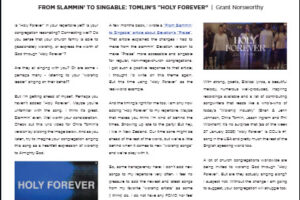Take this link to read Grant’s article as featured in the March issue of Worship…

ENGINE OIL & BETTER TECH-TO-MUSO COMMUNICATION
By Grant Norsworthy
Have you ever poured oil into a car engine? Both of our family’s vehicles are rather high in the mileage department, so checking and topping off engine oil is a regular part of my life. But even with that amount of experience, I can easily make a mess of it. If I want to get the job done right, there are principles I need to apply.
And those principles make me think of better ways for church techies and musos to get the job done too. As we set up, sound check and prepare music for congregational worship, establishing these habits can improve communication and the working relationship.
1) FIRST, CHECK THE DIPSTICK
Before adding oil, check the level. Maybe the engine doesn’t need more oil.
If there is some technical problem on the platform, singers and instrumentalists should first check if it’s something that they can solve themselves. If you can’t solve it, then (and only then) reach out to the audio tech.
Does this sound familiar? The information, “My acoustic guitar isn’t in my monitor” is delivered to the audio tech, who then has to waste precious moments only to find that the musician has not plugged in their instrument! (Groan)
2) ONLY ONE POURER
I love having my 5- and 3-year-old sons sitting on a fender each to watch as I check and add oil to the car engine. But you won’t see me handing each of them their own oil bottle and have all three of us adding oil at the same time! Can you imagine what a mess that would make?!
I have often witnessed church bands trying to prepare for a service, and there are multiple people on the platform making simultaneous, urgent requests of the flustered and overworked audio tech. It just plain doesn’t work! One at a time, please.
3) A FUNNEL
To avoid oil spills, I know I’ll need a funnel. Every band on the platform also needs a communication funnel. I am a big advocate for every musical ensemble needing one individual who is the Musical Director, or MD. That person must act as a funnel through which all tech-to-muso and muso-to-tech communication flows.
If a singer notices that her mic battery has died, she should tell the MD who will communicate the problem to the audio tech. And it works both ways. If the audio tech needs the electric guitarist to turn down, or reposition his amp, that too should flow through the musical director.
The MD ought to be the most musically and technically capable – and probably the most experienced – member of the band. But they will also need to have great people skills and excellent communication.
And remember: Anything with two heads is a monster.
4) A STEADY HAND
You can’t pour oil into an engine in a hurry. The dreaded oil “glug” of trying to get too much flow is sure to see brown goo dribbling down your engine block and onto the carport floor.
In the same way, communication between the MD and the audio tech needs to be evenly paced, clear, succinct and kept to only the essential information. No panic, please. Prep time is precious. Let’s use it well.
5) KNOW THE ENGINE – KNOW THE OIL
Under any car’s hood, there are several different places where fluids can be added. I need to know my engine and fluids well enough to know which goes where.
Similarly, a great working relationship, characterized by effective communication, is built on healthy relationships. The technicians must be known by and know the musos. They must see each other as members of the same team. Indeed, it’s a good thing if all those on the platform recognize that the audio tech is THE MOST important member of the band! They have the only truly objective ears and have more influence on the quality of the band’s sound than any other individual.
In particular, the relationship between MD and audio tech needs to be smooth and strong. Each must have agreed, understood goals, mutual respect and know how to communicate well with each other.
A pet peeve of mine is how often musos will gather to pray – before rehearsal or the service – and simply leave the technicians out of it! I love seeing the gratefully shocked faces of technicians when I bring a band right up to the mixing console to have the team pray together. “I’ve never been asked to pray with the band before!” is but one comment I’ve heard in response.
6) THE RIGHT AMOUNT
It’s important to add the correct volume of oil. Not too much and not too little. Either can end up shortening the life of the engine.
Communication between MD and audio tech should also be in the right amount. There’s no need to go into unnecessary details during our limited prep time.
But it’s more common, and potentially more damaging, when there’s not enough communication. Audio techs: If it needs to be said, say it! If the singers are not using the mics correctly, let the MD know. If the electric guitarist is jamming while you’re trying to run a sound check, tell the MD how much more difficult it makes the job and that it needs to stop.
Do it succinctly, direct, clean and without a hint of malice. And please don’t just mutter your grievances to the projectionist or anyone else who happens to be within earshot. That won’t help.
7) CHECK THE DIPSTICK AGAIN
Most audio technicians I have met – especially volunteer church techs – are very humble people who tend not to say what they know needs to be said unless they’re asked. Perhaps they tried once or three times, only to be ignored, and they’ve given up.
After sound check, rehearsal and the service, the MD should ask the audio tech for their honest opinion of the band’s sound. I have found that the best way to do this is simply to ask, “Is there anything we need to change to improve the sound?” or, “How’d it go? Is there any helpful info I can bring back to the team?”
After adding oil to an engine, I need to check the dipstick again. In the same way that I need to be sure that I have added the right amount of oil to the engine, as an MD I need to check in with the audio tech retrospectively.
CONCLUSION
Sad but true. Communication between technicians and musicians is often less than ideal.
Less than ideal? I’m being too diplomatic. Let’s be honest. The working relationship – as indicated by poor communication between the mixing console and the platform – is often terrible. Even non-existent! Especially (it seems) in the mainly amateur, volunteer church setting.
Many church technicians I have spoken to feel almost totally disregarded by the singers and instrumentalists on the platform. If not ignored, they feel they are seen as a “necessary evil” who are present only to give those on the platform what they want. Maybe it’s not that bad for you, but I’m sure you’ll see room for improvement.
Yes, there are heart issues at play here, and they may run deep. But aside from those, there are practical things that should be done to improve the communication and the relationship between techie and musos.
Let’s make it a priority!
This article was published by Worship Tech Director of the WFX Network on March 15, 2018.


